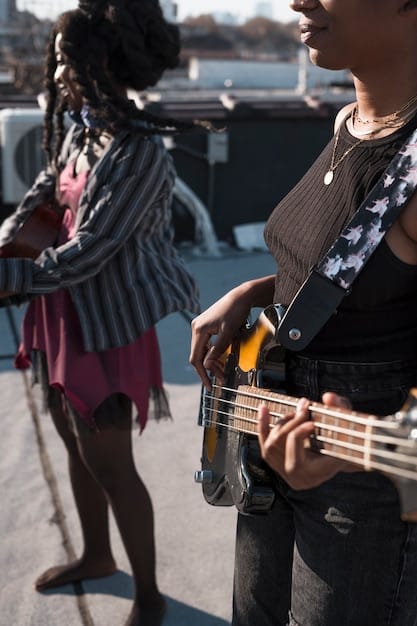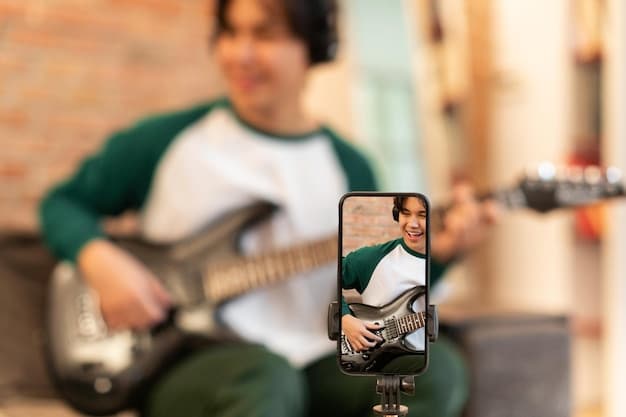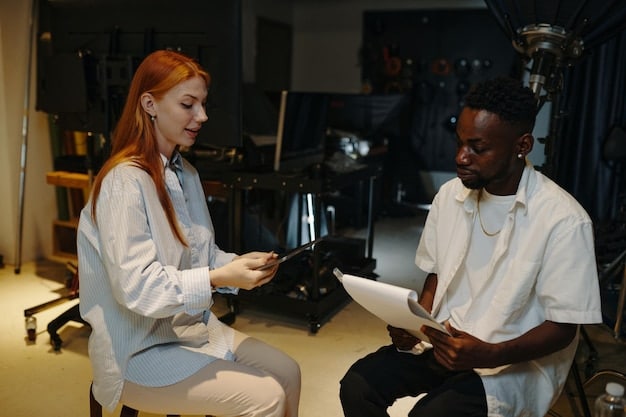US Music Industry: Independent Artists Thriving in the Digital Age

US Music Industry Trends: How Are Independent Artists Thriving in the Digital Age? Independent artists in the US are leveraging digital platforms, social media, and direct fan engagement to build successful careers, bypassing traditional industry gatekeepers and fostering innovation in music creation and distribution.
The US music industry is undergoing a seismic shift, and independent artists are at the forefront, reshaping the landscape. How are these artists navigating the digital age to not only survive but thrive?
The Rise of Independent Artists in the US Music Scene
The music industry has long been dominated by major labels, but the digital revolution has leveled the playing field. Independent artists are now empowered to create, distribute, and market their music directly to fans, bypassing the traditional gatekeepers.
This shift has democratized the industry, allowing a more diverse range of voices and genres to flourish. Let’s explore the factors driving the rise of independent artists and their increasing influence.
Digital Distribution and Streaming Services
Streaming services like Spotify, Apple Music, and Amazon Music have revolutionized music consumption. For independent artists, these platforms offer unprecedented access to a global audience.
- **Direct Upload:** Platforms like DistroKid and CD Baby allow artists to upload their music directly to streaming services without needing a record label.
- **Revenue Streams:** While revenue per stream may be low, the cumulative effect of millions of streams can generate significant income.
- **Data Analytics:** Streaming services provide data on listener demographics and listening habits, helping artists tailor their marketing efforts.
The Power of Social Media and Online Communities
Social media platforms like Instagram, TikTok, and YouTube are essential tools for independent artists to connect with fans, build their brand, and promote their music.

- **Direct Fan Engagement:** Artists can interact directly with fans through comments, live streams, and behind-the-scenes content.
- **Targeted Marketing:** Social media advertising allows artists to reach specific demographics and promote their music to potential new fans.
- **Viral Potential:** Platforms like TikTok offer the opportunity for songs to go viral, reaching millions of listeners overnight.
In conclusion, digital distribution and social media have empowered independent artists to build sustainable careers and reach a global audience.
Monetizing Music: Beyond Streaming Revenue
While streaming revenue is important, independent artists are finding innovative ways to monetize their music and build diverse income streams. Diversification is key to financial stability in the modern music industry.
By exploring alternative revenue sources, artists are better positioned to support their creative endeavors and sustain their careers.
Merchandise and Direct-to-Fan Sales
Selling merchandise like t-shirts, posters, and vinyl records directly to fans can be a lucrative revenue stream. Platforms like Bandcamp and Shopify make it easy for artists to set up online stores.
Direct-to-fan sales allow artists to retain a larger portion of the revenue compared to selling through traditional retailers.
Crowdfunding and Fan Subscriptions
Crowdfunding platforms like Kickstarter and Patreon enable artists to raise money for recording projects, tours, and other creative endeavors. Fan subscriptions offer a recurring revenue stream in exchange for exclusive content and perks.
These models foster a deeper connection between artists and fans, creating a sense of community and shared ownership.
Licensing and Sync Opportunities
Licensing music for use in films, TV shows, commercials, and video games can be a significant source of income for independent artists. Sync licensing agencies help artists connect with potential clients.

Successful sync placements can expose an artist’s music to a wider audience and generate substantial royalties.
Ultimately, by diversifying their revenue streams and engaging directly with fans, independent artists can build sustainable and fulfilling careers in the US music industry.
Building a Brand: Authenticity and Fan Engagement
In the crowded digital landscape, building a strong brand is crucial for independent artists to stand out and attract fans. Authenticity and genuine engagement are key to fostering a loyal fan base.
A well-defined brand helps artists communicate their unique identity and connect with fans on a deeper level.
Defining Your Artistic Identity
What makes your music unique? What are your values and beliefs? Defining your artistic identity helps you create a consistent brand message that resonates with your target audience.
Authenticity is key – fans can spot inauthenticity a mile away. Be true to yourself and your artistic vision.
Engaging with Fans Online and Offline
Respond to comments on social media, host live Q&A sessions, and create opportunities for fans to connect with you in person at shows. Building personal connections can foster a sense of loyalty and community.
Remember, your fans are your biggest advocates. Treat them with respect and appreciation.
Collaborations and Cross-Promotion
Collaborating with other artists can expose your music to new audiences and expand your reach. Cross-promotion on social media can also help you tap into new fan bases.
- Collaborating with other musicians
- Participating in industry events
- Promoting each other’s work.
In summary, Building a strong brand is essential for independent artists to attract and retain fans and thrive in the competitive US music scene.
Navigating Legal and Business Challenges
The US music industry can be complex and challenging, especially for independent artists who may lack the resources and expertise of major labels. Understanding legal and business aspects is crucial for protecting your rights and building a sustainable career.
Seeking professional advice and educating yourself about industry best practices can help you avoid costly mistakes and make informed decisions.
Copyright and Intellectual Property
Copyright protects your original musical works and gives you the exclusive right to control how they are used. Registering your copyrights with the US Copyright Office can provide legal protection and enable you to enforce your rights against infringement.
- Copyright registration
- Understanding fair use
- Protecting your intellectual property.
Contracts and Agreements
Review all contracts and agreements carefully before signing, and seek legal advice if necessary. Make sure you understand the terms and conditions and how they will affect your rights and royalties.
Common contracts include recording agreements, publishing agreements, and licensing agreements.
Business Structures and Finances
Choose the right business structure for your music career, such as a sole proprietorship, LLC, or corporation. Keep accurate records of your income and expenses and file your taxes on time.
Consider hiring a qualified accountant to help you manage your finances and ensure compliance with tax laws.
Understanding legal and business aspects is crucial for independent artists to protect their rights, manage their finances, and build sustainable careers in the US music industry.
The Role of Mentorship and Community Support
Navigating the music industry can be daunting, but independent artists don’t have to go it alone. Mentorship and community support can provide valuable guidance, resources, and encouragement.
Connecting with experienced mentors and fellow artists can help you learn from their successes and failures, build your network, and overcome challenges.
Finding Mentors and Advisors
Seek out mentors who have experience in the areas where you need help, such as music production, marketing, or legal issues. Attend industry events and networking opportunities to connect with potential mentors.
Don’t be afraid to ask for advice – most people are happy to share their knowledge and experience.
- Looking for experienced in the field.
- Participating in industry events for networking.
- Not afraid to reach out and ask for help.
Building a Supportive Community
Connect with other artists in your genre or local music scene. Share your experiences, offer encouragement, and collaborate on projects. Building a supportive community can help you stay motivated and inspired.
Attend local shows, join online forums, and participate in workshops and conferences.
Accessing Resources and Opportunities
Take advantage of resources and opportunities offered by organizations like the Recording Academy, ASCAP, BMI, and SESAC. These organizations provide education, advocacy, and support for music creators.
Apply for grants, scholarships, and residency programs that can help you fund your creative projects and advance your career.
In summary, mentorship and community support provide valuable guidance, resources, and encouragement for your music career.
Future Trends and Innovations for Independent Artists
The US music industry is constantly evolving, and independent artists must stay ahead of the curve to remain competitive. Embracing new technologies and adapting to changing consumer behaviors is crucial for long-term success.
Exploring future trends and innovations can help artists identify new opportunities and position themselves for growth.
Artificial Intelligence and Music Creation
AI-powered tools are increasingly being used in music creation, from generating melodies and harmonies to mastering tracks. Independent artists can leverage these tools to enhance their creative process and improve the quality of their music.
However, it’s important to use AI ethically and responsibly, respecting copyright laws and avoiding the creation of derivative works.
Virtual Reality and Immersive Experiences
Virtual reality (VR) offers new opportunities for artists to create immersive experiences for their fans, such as virtual concerts and behind-the-scenes tours. VR can also be used to create interactive music videos and personalized listening experiences.
Experimenting with VR can help artists connect with fans in new and exciting ways.
Blockchain and Music Ownership
Blockchain technology can revolutionize music ownership and distribution by creating a transparent and decentralized system for tracking royalties and managing rights. Independent artists can use blockchain to sell their music directly to fans and bypass traditional intermediaries.
Embracing future trends and innovations can help independent artists thrive in the ever-evolving US music industry.
| Key Point | Brief Description |
|---|---|
| 🎵 Digital Distribution | Platforms like Spotify enable direct uploads and global reach. |
| 📣 Social Media Power | Engage fans directly through platforms like Instagram and TikTok. |
| 💰 Monetization Methods | Diversify income with merch, crowdfunding, and sync licensing. |
| 🤝 Community Support | Mentorship and networking foster growth and resilience. |
FAQ
Independent artists can use distributors like DistroKid or CD Baby to upload their music to Spotify. These services handle the licensing and distribution to the platform, allowing artists to reach a wider audience.
Effective strategies include consistent posting, engaging with fans, using relevant hashtags, running targeted ads, and creating visually appealing content. Live streams and behind-the-scenes content also help connect with fans.
Owning your masters is very important as it gives you full control over your music. You retain all royalties and licensing fees, and have the freedom to decide how your music is used and distributed.
Collaboration can be crucial as it exposes your music to new audiences and expands your reach. Working with other artists can bring fresh perspectives and can help you grow as an artist and musician.
To protect their music, artists should register their copyrights with the US Copyright Office. They should also monitor online platforms for unauthorized use and take legal action if infringement is discovered.
Conclusion
In conclusion, the rise of independent artists in the US music industry is a testament to the power of digital technology and the entrepreneurial spirit of musicians. By leveraging digital platforms, diversifying their revenue streams, building strong brands, and embracing future trends, independent artists can thrive in the modern music landscape and create fulfilling and sustainable careers. Mentorship is key in the process, finding a reliable and experience mentor, will give the artist a step ahead.





